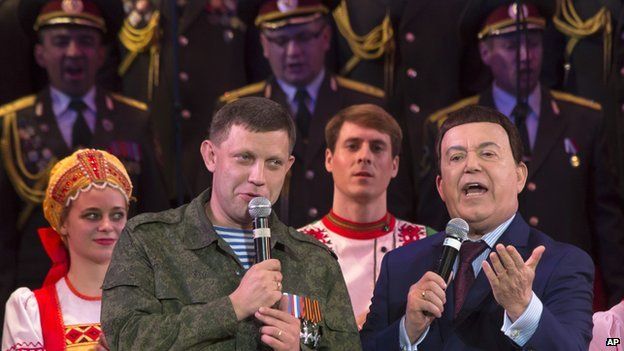Ukraine crisis: Russia to recognise rebel vote in Donetsk and Luhansk
- Published

Russia says it will recognise the results of controversial separatist elections in eastern Ukraine, which the rebels plan to hold on 2 November.
Russia's Foreign Minister Sergei Lavrov said elections in the Donetsk and Luhansk regions "will be important to legitimise the authorities there".
But Ukraine and Western governments say the elections should not go ahead. They accuse Russia of arming the rebels.
Poland plans to reinforce its eastern military bases, closer to Ukraine.
Ukrainian troops have been battling the pro-Russian rebels in the east.
A shaky truce took effect on 5 September, but there have been many violations and the situation remains very volatile.
In Kiev pro-Western parties are leading after Ukraine's national parliamentary elections on Sunday.
Voting did not take place in rebel-held eastern districts, or in Crimea, which Russia annexed in March.
Ukraine has urged Russia to put pressure on the separatists not to hold rival elections in the east.
But Mr Lavrov said "we expect the elections will go ahead as agreed, and we will of course recognise the results".
'People's republics'
A Ukrainian diplomat told the AFP news agency that Moscow's support for the rebel vote would "undermine the peace process".
The 2 November vote is much earlier than was agreed by Ukrainian legislation granting the breakaway regions limited self-rule.
"We are reckoning that the vote will be free and that nobody from outside will try to wreck it, " Mr Lavrov said.
The armed separatists who took over government buildings in Donetsk and Luhansk in April have declared "people's republics" in both regions, loyal to Moscow instead of Kiev. The two regions are commonly called "Donbass".
At least 3,700 people have been killed in the fighting and many more have fled to other parts of Ukraine or to Russia.
Meanwhile, Poland's Defence Minister Tomasz Siemoniak said "we want to strengthen our units in the east of Poland" in response to the Ukraine crisis.
"The first effects will be seen in 2017. There will be a whole series of initiatives connected to units in the east. There will also be investments in infrastructure," Reuters news agency quoted him as saying.
Poland joined Nato in 1999, whereas Ukraine remains outside the alliance.
Adam Easton in Warsaw writes:
There has been a significant shift in the Polish military's strategic thinking in recent months, illustrated in the new National Security Strategy approved last week by the government.
For the first time in more than 20 years it admits that Poland is threatened by war and names Russia as an aggressor in Ukraine.
Poles are genuinely concerned about the threat of war breaking out. However, the reinforcement of several garrisons in eastern Poland is less significant.
Minister Siemoniak is not talking here about moving troops and hardware to the east. Poland's best-trained and readily deployable divisions and hardware will remain in the west of the country. Instead he is talking about hiring soldiers over a number of years to reinforce several garrisons that are now staffed at only 30% of their capacity.
He said he wanted to return them to 70%-90% of their old capacity, which may work out at between 1,000-2,500 soldiers. That's just 1%-2.5% of Poland's armed forces.
Russian role
In 2008 Russia also backed pro-Russian separatists in Georgia and later recognised the breakaway regions as independent.
Under the truce deal the Ukrainian authorities pledged not to prosecute the leaders of the eastern rebellion - yet many Ukrainian politicians want prosecutions, denouncing the rebels as "terrorists".
The deal also called for a withdrawal of "illegal militant groups" from Ukraine, but the rebels remain heavily armed and it is not clear how many Russian "volunteer" soldiers are still there helping them.
Moscow says any Russian soldiers fighting in Ukraine are freelance "volunteers", although Ukraine and Western governments said Russia had earlier sent in regular army units.
'War from the east'
Kremlin spokesman Dmitry Peskov confirmed that Russia would support the separatists' election, saying "Russia does not have unlimited levers of influence, and it is not worth exaggerating them.
"In this case, the main factor is not Russia's influence but the decision taken by the leadership of these republics and these peoples," he said.
A senior Ukrainian foreign ministry official, Dmytro Kuleba, told AFP that Moscow was jeopardising the ceasefire deal signed in Minsk.
"Russia's intentions directly contradict the Minsk accord, undermine the agreed process on de-escalation and peaceful resolution, and continue to weaken trust in it [Russia] as a reliable international partner," he said.
Ukraine's President Petro Poroshenko drew a parallel between the Donbass conflict and World War Two on Tuesday, saying "this time it [war] appeared not from the west but from the east".
"For the first time in 70 years, we again must defend Ukraine, its territorial integrity and freedom."